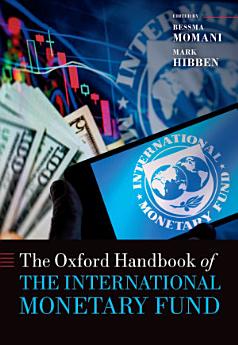Oxford Handbook of the International Monetary Fund
Bessma Momani · Mark Hibben
Oct 2024 · Oxford University Press
Ebook
832
Pages
family_home
Eligible
info
reportRatings and reviews aren’t verified Learn More
About this ebook
The International Monetary Fund (IMF) is a pivotal institution in global economic governance tasked with ensuring monetary stability and preventing financial crises through promoting balanced trade, economic growth, and poverty reduction. It also plays a powerful normative role by shaping economic policies worldwide through its research and expertise. The IMF played a crucial role in managing crises like the 2008 financial crisis and the COVID-19 pandemic, providing significant financial aid and advocating for stimulus measures. However, the IMF faces both internal and external challenges from reforming its governance structure to better represent emerging economies to finding its place in a world increasingly defying liberal internationalism and multilateralism. Despite reforms, power remains concentrated among advanced economies, hindering inclusivity and trust, particularly in regions like sub-Saharan Africa. Geopolitical tensions, populist nationalism, and economic imbalances further strain the IMF's effectiveness. This handbook aims to uncover these challenges by providing diverse perspectives and proposing policy recommendations that the Fund could undertake to better navigate the complex landscape of 21st-century global governance. Part I delves into its historical origins and key debates of the IMF. Part II focuses on formal operations such as lending, surveillance, and capacity development. Part III explores the involvement of different actors including states, markets, and civil society. Part IV discusses partnerships with other international organizations and collaboration in financial regulation. Part V analyzes shifts in policy instruments and ideological frameworks. Part VI broadens concerns to include gender mainstreaming, labor markets, climate policy, and inclusive growth. Part VII addresses internal challenges including cultural diversity concerns and uniformity of treatment. Part VIII evaluates external challenges such as populist movements, China's influence, global inequality and unresolved issues in Europe. Part IX explores how the IMF can meet the multiple challenges identified in this volume and positively impact 21st century global governance.
About the author
Dr. Bessma Momani is Associate Vice-President, International and Full Professor in the Department of Political Science at the University of Waterloo. She is a senior fellow at the Centre for International Governance Innovation, a Fulbright Scholar, a Governor on the board of the International Development Research Centre, and a member of the advisory board of the Canadian International Council. She has worked as a consultant to the International Monetary Fund, both in the communications office and the Independent Evaluation Office, and to Global Affairs Canada (GAC) as a 2021 Visiting Scholar in its International Assistance Research and Knowledge Division. Dr. Mark Hibben is Associate Professor of Political Science at Saint Joseph's College of Maine. His research interests include the politics of development, with a specific focus on the International Monetary Fund and World Bank. Book publications include the co-authored (with Bessma Momani) What is Wrong with the IMF and How to Fix It (Polity) and Poor States Power, and the Politics of IMF Reform: Drivers of Change in the Post-Washington Consensus (Palgrave Macmillan). His work is also published in The Review of International Organizations, Journal of International Organizational Studies, and The Journal of International Relations and Development.
Rate this ebook
Tell us what you think.
Reading information
Smartphones and tablets
Install the Google Play Books app for Android and iPad/iPhone. It syncs automatically with your account and allows you to read online or offline wherever you are.
Laptops and computers
You can listen to audiobooks purchased on Google Play using your computer's web browser.
eReaders and other devices
To read on e-ink devices like Kobo eReaders, you'll need to download a file and transfer it to your device. Follow the detailed Help Center instructions to transfer the files to supported eReaders.





